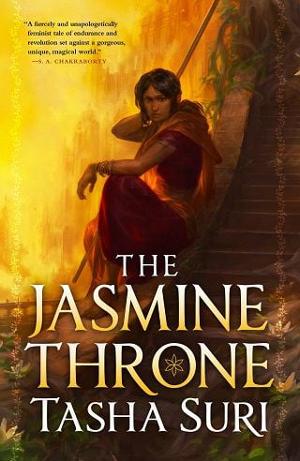Chapter 55: Ashok
ASHOK
They began to die. One, then two. Then a third.
“Thrice-dead,” he murmured, as he closed eyes. Felt silent wrists. If only there were a magic in this, as there was in surviving the waters. But death was a failure, and the deathless waters granted nothing in return for their due.
He listened to labored, water-laden lungs heaving for breath around him, and felt the tightness in his own. He felt the tremor of his own strength beginning to seep out of him.
They kept on walking. He could feel Priya and Bhumika. He could follow the pulse of their presence in the sangam and the green of the soil until he found them once more, and then he would take Priya’s knowledge, by trickery or violence or if it came to it, by pleading at her feet.
Then Ashok began to grow more ill: blood rising in his sweat, in his eyes.
He and his followers stopped to rest, under the shade of a bower. There were no bodies buried here, but Ashok could only think of what a peaceful place this was, and how good a resting place it would be for his own bones.
He did not want to burn when he died. He’d had enough of fire.
“Ashok.” Kritika’s voice. She kneeled down beside him. She opened her satchel, removing a crown mask with careful hands, making sure to only hold it by the cloth that bound it. She lowered it to the ground. Then she lifted out a small thing. A thing of glass that glowed faintly blue.
There was only one vial left.
Kritika held it upon her palm.
“You must drink,” she said. When she blinked, he saw blood upon her lashes, and wondered what dread thing the water was doing to her from within.
“You must drink,” she said. “You must survive.”
“Kritika.”
“You must become thrice-born, and become the high elder, and wear this mask.” She nudged it forward. “You must save Ahiranya. So drink.”
He wanted to. He thirsted. He was parched and empty, a husk on the verge of inward collapse.
But he could not drink.
“You have been with me longer than any of the others. I will tell you the truth,” Ashok murmured. Kritika leaned in closer, to listen to him. “I don’t have the strength to do what needs to be done. I will not survive to find my sister and fight for her and return home to the Hirana. So I will not drink.”
Kritika said nothing and nothing, but her lip began to subtly tremble. The sight of her distress almost weakened his resolve.
“You are our only hope, Ashok,” she said. “You always have been. Do not give in to despair now, I beg you. There is a future for Ahiranya still, and for us.”
A trickle of blood escaped her nose.
He could not bear to see her dead. He could not.
He thought for a dark moment of ending it for them both. It would be simple. Perhaps honorable even. Like something for a dramatic tale, enacted by players in masks on a village stage. He had a knife, a fine sharp blade, in his belt.
“I am grateful beyond words, that you saved me, all those years ago,” he said instead. “If you had not given me the waters, I would have died of the sickness eating my lungs. Died in shame, and alone. If this rebellion has accomplished anything, it is because of you.”
“I was a pilgrim to the Hirana for the same reason as all the rest, Ashok,” Kritika said, moving the vial back and forth gently between her palms. “I wanted better for myself. My family. Ahiranya. And when all was dark, and I thought nothing could be saved—ah, finding you saved me.”
“I never had a mother,” he said. “And—you are not my mother.” A choked laugh. “A mother doesn’t follow her son to war.” He took her hand, curling her fingers around the vial. Pressed it back to her.
“You will drink it,” he said. “Or no one will. Do you understand? My vision must survive me. Ahiranya must be saved. Must be free.” His voice was suddenly ragged. “This country needs protectors. If my siblings will not allow me to do it, then they must. Or you must.”
“You want me to pass through the waters three times.” She sounded disbelieving. “I am not a temple child, Ashok.”
“We were trained for it,” he said. “Trained to be strong enough to survive it. It would be a miracle if you did, and yet that’s what I ask of you, Kritika. Seek a miracle. You and the other rebels. If even one or two of you can find the deathless waters—if you can survive the process—your strength would be enough. It would be enough.”
“I would do anything for Ahiranya,” said Kritika, voice trembling. “I drank from the vial, even knowing it would mean my death. We all did. But there are limits to what any of us can do, no matter what we may wish to.”
“Then convince my sisters to be more than they are,” he said tiredly. “Only drink, so that you have the time to do it.”
Kritika bowed her head, elegant in obedience.
She touched her fingertip to the top of the vial. Pressed her finger to her tongue.
“Drink it,” he said hoarsely. “Don’t simply dab it. Soil and sky, you will not survive like that. It’s not enough.”
She stood. She reached down, picking up the mask and the vial once more. He saw then what she hadn’t removed from the satchel: a square of fermented rice, a rolled-up roti. Fruit, carefully swaddled in cloth to keep it free of ants. She had provisions. And a tight, serious look upon her bloodied face.
She placed the vial in his belt, carefully, then straightened.
“Rest, Ashok,” she said gently. “I’ll return.”
 Fullepub
Fullepub 



